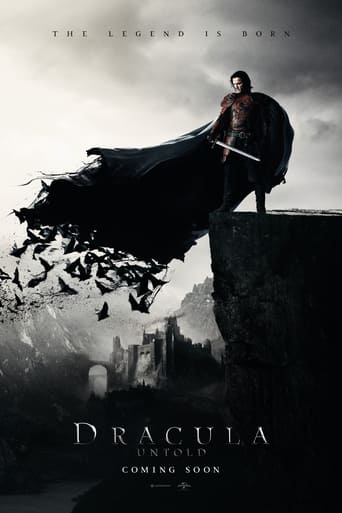Cineanalyst
Despite the critical panning of "The Mummy" (2017), Universal's official launching of its Dark Universe, I think they were wise to not begin the series with this one, "Dracula Untold," although they've flirted with doing so. Not only is it a complete departure from Bram Stoker's novel and the prior Universal monster movies, which began with 1931's "Dracula," or that it's so devoid of authenticity for the historical Vlad the Impaler or reality in general, but, worse yet, it's such a blatant and largely failed ploy at co-opting the formulae of superhero movies, such as the Dark Knight trilogy, but especially the Marvel Cinematic Universe, whose success has become the envy of all Hollywood. And, from the perspective of ignorant racist vilification, "Dracula Untold" is essentially a toned-down, one-man versus "the other" version of "300" (2006).I've seen over 50 Dracula-related movies now since reading Stoker's book, and it's baffling how far removed some of the mainstream tendencies in depictions of the titular character have come, to the point that essentially nothing in "Dracula Untold" besides the names and locations can be traced back to Stoker. I suspect at least some of the primary filmmakers involved didn't even read the book; if they did, they obviously needn't have bothered, because they didn't use it. What they obviously did, however, was view other Dracula movies, as well as the superhero ones. Two trends in Dracula movies, which owe next to nothing to Stoker, and which I've found especially irritating are the transformation of Dracula into a romantic and sympathetic figure, often through the device of a reincarnation romance, and the greater assertion of and focus upon Dracula having been the historical Vlad the Impaler. Stoker's "Dracula" owes its title and a couple sentences of speculation made by Van Helsing to the Vlad connection, and the earliest movie I know to even mention it is the Turkish adaptation, "Drakula Istanbul'da" (1953). Had Stoker cared to dwell as much as the movies have upon his character's origins, he may've learned that Vlad was the Prince of Wallachia, an entirely different country than Transylvania.For Stoker, Dracula was also plainly a barer of immorality and even a surrogate for unmentioned venereal disease. A 1974 TV movie, mistitled "Bram Stoker's Dracula," by Dan Curtis first combined Vlad with a reincarnation romance, a trope that had already been employed by Curtis in his "Dark Shadows" TV series, as well as in the Dracula-esque blaxploitation flick "Blacula" (1972). If not the reincarnation romance, the portrayal of Dracula as a sympathetic romantic figure has persisted since in "The Great Love of Count Dracula" (1973), "Dracula and Son" (1976), "Nosferatu" (1979), "Nosferatu in Venice" (1988), the 1992 "Bram Stoker's Dracula," "Dracula Rising" (1993) and other Dracula, as well as numerous other vampire, movies.Unfortunately, "Dracula Untold" rehashes both of these threads and puts them in a superhero origins story. Vlad becomes vampire to save family, he rather effortlessly defeats entire armies of Turks, struggles to avoid eternal damnation as vampire, but loses wife in tragic slow-motion sequence, Vlad saves son but cue another slow-motion sequence somewhere and, centuries later, Vlad sees Mina, the twin reincarnation of his dead wife, played by the same actress. And, if copying other Dracula movies and superhero movies weren't enough, they throw in Tywin Lannister informing us that the games have begun. As mindless popcorn fare, "Dracula Untold" isn't entirely awful, but with that setup, I'm not excited for a sequel.(Mirror Note: Dracula's reflection is seen in a sword as he kills Turks in battle. As this was during the movie's invented period where Vlad was undead but not yet condemned to an eternity as a vampire, it may be supposed that he would later not have a reflection, as Dracula shouldn't, but Stoker's Dracula also wasn't harmed by silver or sunlight, so whatever....)























